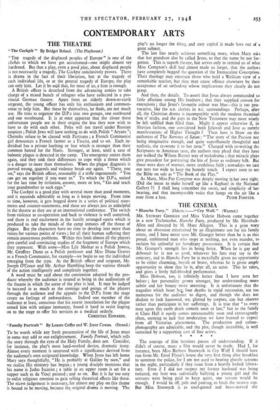CONTEMPORARY ARTS
THE THEATRE
" The Cockpit " By Bridget Boland. (The Playhouse.)
"THE tragedy of the displaced peoples of Europe" is one of the clichis to which we have got accustomed—one might almost say hardened. But that a play, even a good play, about displaced people is not necessarily a tragedy, The Cockpit conclusively proves. There is drama in the fact of their liberation, but at the tragedy of each individual life, or at the general tragedy of Europe, the play can only hint. Let it be -said that, for most of us, a hint is enough.
A British officer is detached from the advancing armies to take charge of a mixed bunch of refugees who have collected in a pro- vincial German theatre. Apart from an elderly down-to-earth sergeant, the young officer has only his enthusiasm and common- sense to help him. But these by themselves, he finds, are not much use. He tries to organise the D.P.s into two groups, one eastbound and one westbound. It is at once apparent that the closer these unfortunate people are in their origins the less they now wish to have to do with each other. Poles will not travel under Russian auspices ; Polish Jews will have nothing to do with Polish " Aryans "; Chetniks refuse to be classed with Partisans ; a French Communist girl denounces a French farmer as a Fascist, and so on. Each in- dividual has a private loathing or fear which is stronger than their common hatred for the Nazis. Stronger, at least, until a case of bubonic plague is detected in the camp. The emergency unites them again, and they sink their differences to cope with a threat which is a danger to more than themselves. When the plague diagnosis is proved wrong, quarrels and violence break out again. " There, you see," says the British officer, reasonably if a trifle ingenuously. " You can get on together if you want to." To which the D.P.s, united for the last time by irritation, answer, more or less, " Go and teach your grandmother to suck eggs."
The Cockpit is a good play with several more than good moments, and it succeeds admirably as long as it keeps moving. From time to time, however, it gets bogged down in a series of political state- ments :nd counter-statements, and these are always just as unhelpful in the theatre as they are at an international conference. The switch from violence to co-operation and back to violence is well contrived, and there is real excitement in the hastily arranged opera which is produced to take the minds of the camp inmates off the threat of plague. But the characters have no time to develop into more than voices for various points of views • for all their human suffering they remain anonymous problems. Within this limit almost all the players give careful and convincing studies of the fragment of Europe which they represent. With some—Miss Lily Molnar as a Polish Jewess,. Mr. Geoffrey Dunn as a Polish professor and Miss Diana Graves as a French Communist, for example—we begin to see the individual emerging from the type. As the British officer and sergeant, Mr. Joseph O'Conor and Mr. Arthur Hambling keep the various threads of the action intelligently and completely together.
A word must be said about the convention adopted by the pro- ducer whereby the audience is treated as being in the auditorium of the theatre in which the scene of the play is laid. It may be judged to succeed in as much as the comings and goings of the players through the audience and the appeals to the D.P.s from the stage create no feelings of awkwardness. Indeed one member of the audience At least, conscious that his recent inoculation for the plague armed him with unique immunity, found it hard to resist leaping on to the stage to offer his services as a medical orderly.
CHRISTIAN EDWARDS.


































 Previous page
Previous page